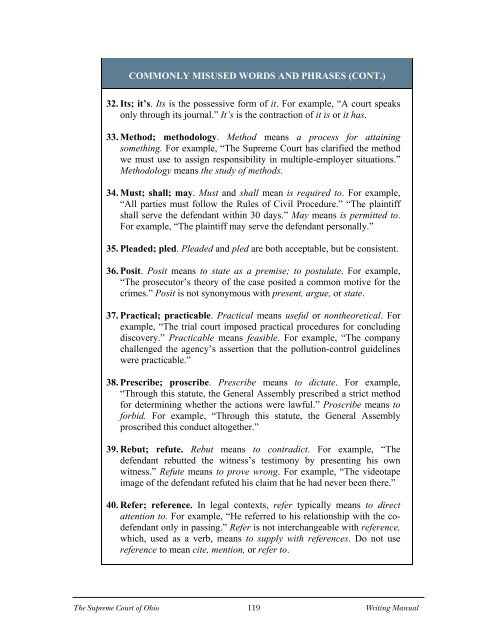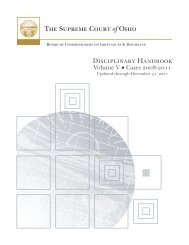WRITING MANUAL - Supreme Court - State of Ohio
WRITING MANUAL - Supreme Court - State of Ohio
WRITING MANUAL - Supreme Court - State of Ohio
Create successful ePaper yourself
Turn your PDF publications into a flip-book with our unique Google optimized e-Paper software.
COMMONLY MISUSED WORDS AND PHRASES (CONT.)<br />
32. Its; it’s. Its is the possessive form <strong>of</strong> it. For example, “A court speaks<br />
only through its journal.” It’s is the contraction <strong>of</strong> it is or it has.<br />
33. Method; methodology. Method means a process for attaining<br />
something. For example, “The <strong>Supreme</strong> <strong>Court</strong> has clarified the method<br />
we must use to assign responsibility in multiple-employer situations.”<br />
Methodology means the study <strong>of</strong> methods.<br />
34. Must; shall; may. Must and shall mean is required to. For example,<br />
“All parties must follow the Rules <strong>of</strong> Civil Procedure.” “The plaintiff<br />
shall serve the defendant within 30 days.” May means is permitted to.<br />
For example, “The plaintiff may serve the defendant personally.”<br />
35. Pleaded; pled. Pleaded and pled are both acceptable, but be consistent.<br />
36. Posit. Posit means to state as a premise; to postulate. For example,<br />
“The prosecutor’s theory <strong>of</strong> the case posited a common motive for the<br />
crimes.” Posit is not synonymous with present, argue, or state.<br />
37. Practical; practicable. Practical means useful or nontheoretical. For<br />
example, “The trial court imposed practical procedures for concluding<br />
discovery.” Practicable means feasible. For example, “The company<br />
challenged the agency’s assertion that the pollution-control guidelines<br />
were practicable.”<br />
38. Prescribe; proscribe. Prescribe means to dictate. For example,<br />
“Through this statute, the General Assembly prescribed a strict method<br />
for determining whether the actions were lawful.” Proscribe means to<br />
forbid. For example, “Through this statute, the General Assembly<br />
proscribed this conduct altogether.”<br />
39. Rebut; refute. Rebut means to contradict. For example, “The<br />
defendant rebutted the witness’s testimony by presenting his own<br />
witness.” Refute means to prove wrong. For example, “The videotape<br />
image <strong>of</strong> the defendant refuted his claim that he had never been there.”<br />
40. Refer; reference. In legal contexts, refer typically means to direct<br />
attention to. For example, “He referred to his relationship with the codefendant<br />
only in passing.” Refer is not interchangeable with reference,<br />
which, used as a verb, means to supply with references. Do not use<br />
reference to mean cite, mention, or refer to.<br />
The <strong>Supreme</strong> <strong>Court</strong> <strong>of</strong> <strong>Ohio</strong> 119 Writing Manual
















